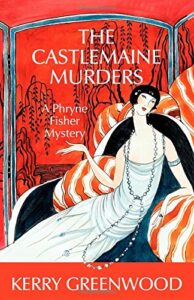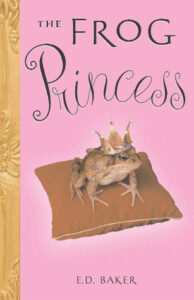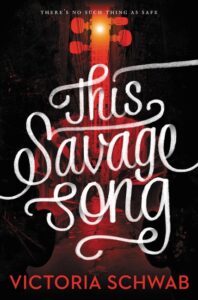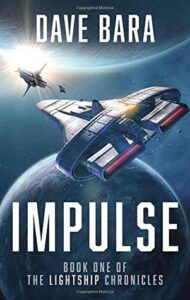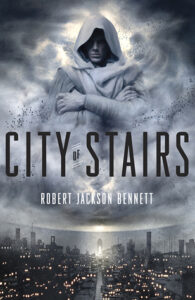 City of Stairs, Robert Jackson Bennett
City of Stairs, Robert Jackson Bennett
I’m sorry it took me so long to get round to City of Stairs, because it turns out that the buzz on Twitter and the recommendations from other bloggers were absolutely right. It’s maintaining a high rating on Goodreads (4.20, with 8,000 ish reviews, at the time of writing), and for good reason. It’s really awesome. Now, if I’m honest, it did take some time to settle down, and to figure out who was going to be the protagonist. There’s a lot to learn about the world: the dos and don’ts, the past, the present, who and what we’re rooting for… Some details only become apparent as the book goes through its twists and turns. Some obvious things are avoided: loyalties can be mixed, long-held understandings overturned.
It’s a mystery/spy novel set in a fantasy world, essentially, and it does a great job of both. I’ve seen reviews which complain that mysteries in a fantastical setting don’t work, because mysteries rely upon rules, and fantasy inherently breaks rules. To me, that seems to rely overly much on the Golden Age idea that a mystery story is a game, which the reader must be able to solve — like Knox’s Ten Commandments, of which the second is: “All supernatural or preternatural agencies are ruled out as a matter of course.”
But even some Golden Age crime fiction satisfyingly flouted those laws — Agatha Christie bent the rules significantly with The Murder of Roger Ackroyd, for example — and there’s no reason we have to stick to it. Fantasy often lets us see familiar things anew: I don’t see why not mystery, espionage, politics, bureaucracy… all of which play a part in City of Stairs. And if the commentary on empire still stings and conjures up spectres and parallels, as it seems to, well, it should.
Which is not saying very much about the book. Once I was into it, it was a page turner: I wanted to know, needed to know. Once the focus became clear, so did the characters: Shara, Sigrud, Mulaghesh… with their flaws, their pasts, their hopes for the future. Shara, particularly, with her knowledge of the past, with her interest in it, paired with a duty to suppress any recognition of it. Granted, at times her knowledge is very encyclopaedically convenient, but I do suspect that if she were a male character, people wouldn’t be complaining of that. She doesn’t always make the right decisions: she just makes some pretty good ones, based on her experience and knowledge.
Imagine a story about a surgeon. A good surgeon: one of the best. High in his profession. He completes a surgery without a mistake, even though something unexpected crops up, because he has the skill and experience. Or a librarian, with experience of his work, immediately nodding and turning to lay his hand on the right book when the plot requires. Is he a “Gary Stu”? An impossibility? Nope, we just believe that his background supports his actions in the story. We would probably call him “confident” and “capable”. I wonder how we’d react to a female surgeon… except I don’t really need to: we have the equivalent in Shara. She’s confident and capable, but people read it as arrogance, as being spoilt and having everything handed to her due to favouritism. (There’s a moment in the book that hangs a lampshade on that, really.)
The story tells you she’s good, and then she shows us it, and… people don’t want to believe it because she’s a woman? Ugh.
I love the background to the world, too: the history, the rules of the way the gods work and the intertwined nature of their relationship with their adherents. I’m excited to read City of Blades, though I don’t know anything yet about where it’s set, or even what the blurb says. I’m happy just to plunge straight into it on the strength of City of Stairs.
Rating: 5/5
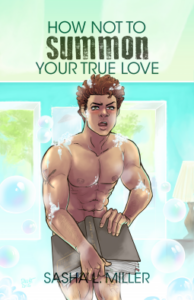 How Not To Summon Your True Love, Sasha L. Miller
How Not To Summon Your True Love, Sasha L. Miller
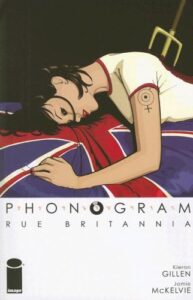
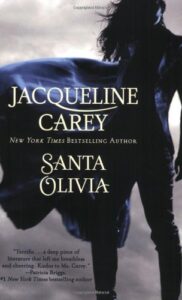
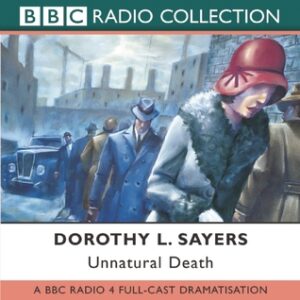

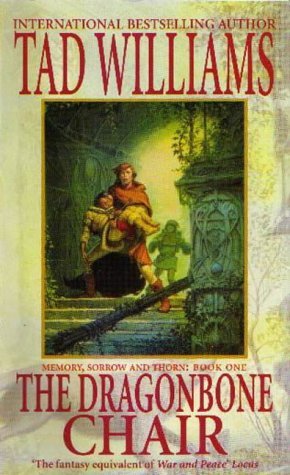 Memory, Sorrow and Thorn, Tad Williams
Memory, Sorrow and Thorn, Tad Williams